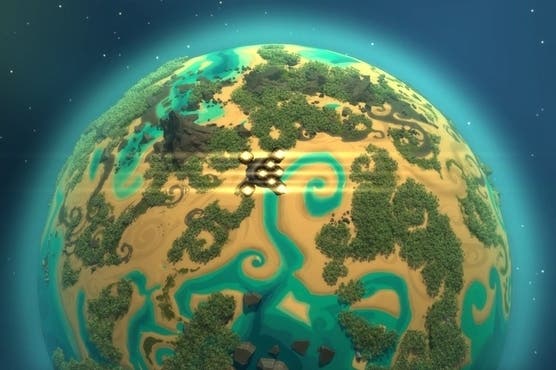Planetary Annihilation Early Access review
Total, total, total war.
I think the genre title "real-time strategy" is something of a misnomer. It's misleading. Sure, while most such games are about assuming generalship and carefully marshalling great throngs of tanks and troops, shaping them into the savage pincers that will squeeze your opponent until they burst like a zit under pressure, being a military commander is really only part of it.
At least equally important is your performance as an economist: your ability to construct and manage an assembly line that will quickly and efficiently produce the war machines you need to perform your deadly dermatology, to wipe your enemy off the face of... whatever it is you're fighting over.
Nowhere is this more the case than in Planetary Annihilation. Not only will you need to busy yourself providing effective air support for your tanks or making sure your precious artillery units are cushioned and safe, you'll also have to pump out a constant stream of all these things, always queuing up more build orders in your factories. If there isn't quite enough power or metal to do this efficiently, you're just going to have to get your construction units to assemble more resource-generating facilities.
If you don't have enough construction units, you'd better churn out a few more of those and, while you're at it, make sure some of them are also building the larger factories which will, in time, assemble the bigger, meaner units that could tip the balance in this arms race. Maybe. If you can make enough of them.
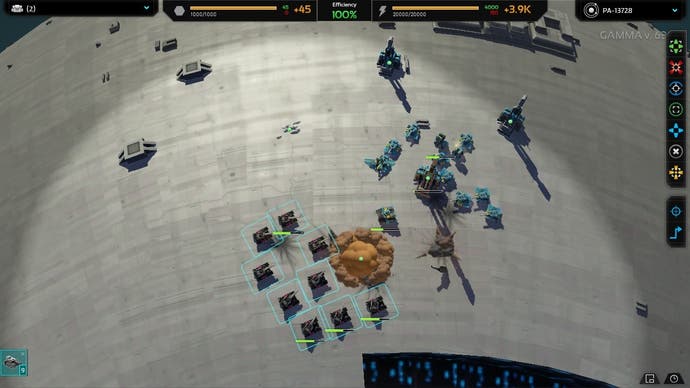
It's relentless, but I suppose that's what war really is at its heart - that ever-surging synergy of strategy and carefully-managed economics. It's particularly relentless in Planetary Annihilation, because you're not going to run out of the power or metal that you need to build your armies. The buildings that generate these resources will happily chug away forever once you've placed them, meaning you don't need to ration, you only ever need to get more. More, and faster.
It's also relentless because there's no pause button yet.
It says something about how demanding Planetary Annihilation is that I didn't actually notice this omission until I was several games in. The same goes for the current lack of saving and loading options, to which I was also oblivious. All this means that, once a game gets going, you're in it until someone wins or everyone quits.
Still, the pace of play means that even large battles - battles with half a dozen players fighting across multiple planets and moons - won't keep you all that long. They'll escalate and escalate until orbital lasers and super-sized battleships lord over the map, or perhaps until someone ends it all by setting a small moon on a collision course with your homeworld.
Really, this is a game about interplanetary annihilation. Larger maps can feature multiple planets and moons, tremendous transports shuttling forces between them, while satellite networks and orbital platforms rule the skies. If you want a quicker conflict, a single-planet fight is possible, but online play tends toward battles across a solar system. While there aren't a great deal of players out there right now, there was almost always at least one game recruiting whenever I checked in and most tended to be conflicts of scale. The AI, then, is your go-to if you want something more modest.
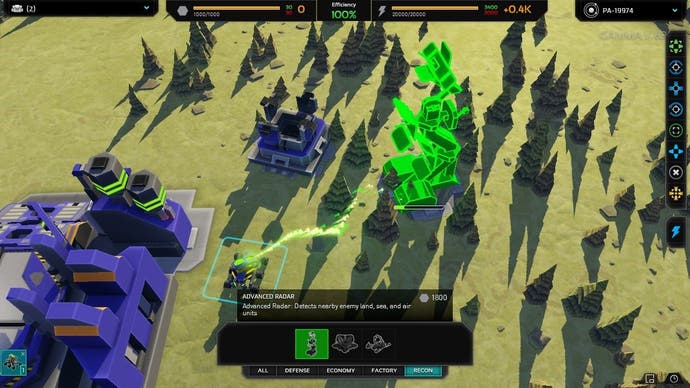
It's a capable opponent, too. Though both friendly and enemy units occasionally experience bizarre pathfinding problems as they scuttle their way around the game's globes, the AI certainly knows the importance of cracking the whip on the assembly line, as well as the practicality of building a diverse army. It's par for the course to talk about a rock-paper-scissors dynamic in RTS units, but it's especially blatant in Planetary Annihilation, and some units crush others within moments, with artillery and bombers being particularly devastating against slow-moving but otherwise dependable ground units.
The AI will also adapt quite swiftly in response to your building choices and I watched one opponent gear its industry toward the space race as soon as it caught wind of my orbital weapon platforms. Before then, my satellites had watched it assembling ground forces that I would have easily rained heavenly fire upon. The cad then began to outpace (outspace?) me, swamping the skies with cheap orbital fighters.
However, the pace of the game does mean that I've seen most battles end before some of the biggest and most exciting units can be deployed. You win a game of Planetary Annihilation by destroying the enemy Commander, a super-unit that constructs the first tier of facilities and factories. From these factories you can then deploy more construction units which, in turn, can build specialist factories that then spawn more advanced units. Tremendous battleships and throbbing uber-tanks are quite thrilling, but in practice it's often wiser to churn out larger forces of cheap or mid-level units. A large and varied army is both a good all-round option and a much quicker alternative to building and managing the infrastructure required to climb those technology tiers.
Managing things is always going to be one of your biggest challenges and there can be an awful lot going on in even a small game. After your Commander puts down the fundamentals of your first base, you'll want factories constantly churning out units and other construction units constantly expanding your facilities or bolstering your defences. You'll have to leap to the scene of a conflict to give orders to units and when the first satellites reach orbit, you'll realise you're co-ordinating ground, air, naval and orbital forces.
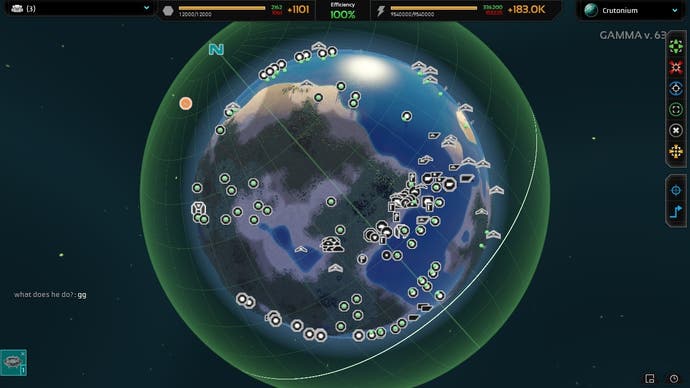
To some, this will be a thrill, to others it will feel like juggling sand - but, thankfully, this isn't a game that demands too much micro-management. Uber Entertainment have made things a little easier by adding plenty of shortcuts and order-queuing, as well as a rather neat picture-in-picture feature that allows you to keep an eye on the action somewhere else.
There's also the very smart Chrono Cam, a tool that allows you to rewind time and replay the action anywhere. Without a pause function, this does mean the rest of the game is still going while you do this, but it's a useful review feature - and the plan is for it to work in conjunction with forthcoming saves and allow players to effectively travel back in time, leaping into a game at any point in its timeline and re-writing its history. It's a very promising idea.
Also promising is how coherent and close to completion Planetary Annihilation feels. There's already a challenging, almost overwhelming RTS here, one that feels balanced and intelligent and which has a clean interface and a vigorous orchestral score. Finding opponents isn't difficult, the netcode performs well even in busy games with hundreds of units, an apparently endless galaxy of procedurally-generated planets can be played on and, if you're feeling particularly godly, there's also a star system designer that will allow you to build your own. Things are coming along nicely.
All this does mean the pause and save features are all the more unusual in their absence, but I can't say I missed them all that much. Rather more glaring were the occasional crashes to desktop that I experienced while in the menu screen, but these never happened while I was actually at war.
It's a game that demands your full attention, a game that will reward dedication and diligence with the cool balm of victory
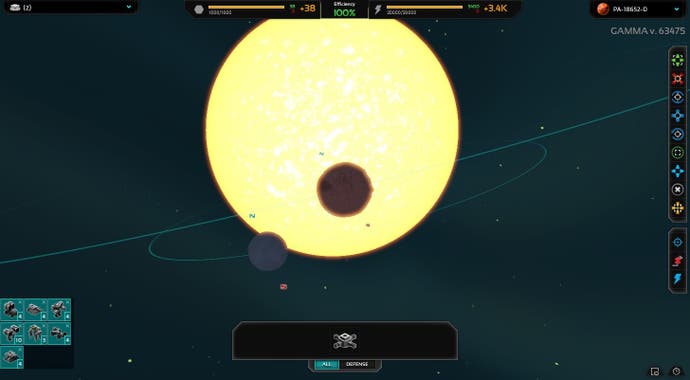
Uber is saying that Planetary Annihilation is no longer in beta, but now in a stage beyond that they've rather coyly called "gamma" where a lot of tweaking and balancing is going to happen, as well as the addition of a few subtle but significant elements like deformable terrain, recoverable wreckage and the ability to set forest alight. Terrain manipulation will be welcome as, right now, the game's planets feel bare and tactically uninteresting.
While the odd mountain can offer a barrier, the only thing that really separates you from an enemy is distance. With few choke points and no need to fight over resources, territorial control and manoeuvring become largely irrelevant, making your job as a general less exciting. Many wars are won by intelligent and inventive strategic decisions, but here it's usually more important to simply dominate economically and thus numerically.
Planetary Annihilation is showing itself to be a brutal and uncompromising take on real-time strategy and, as it taps its way out of its shell, we see that its beak is sharp, its talons are cruel. It's a game that demands your full attention, a game that will reward dedication and diligence (providing you demonstrate enough of it) with the cool balm of victory.
Steel yourself. War on this sort of scale is not for the faint hearted.
Eurogamer's alpha and beta reviews are reviews of games that are still in development but are already being offered for sale or funded by micro-transactions. They offer a preliminary verdict but have no score attached. For more information, read our editor's blog.
